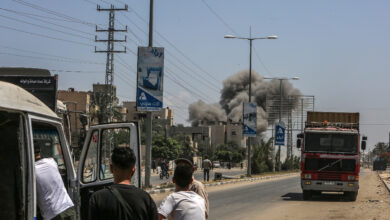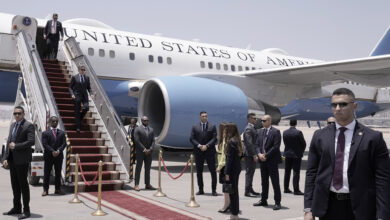The scene is not easily forgotten: Tahrir erupts in jubilation as Egypt’s first democratically-elected civilian president opens his jacket to demonstrate to the thousands assembled, and the millions watching on television, that he is not wearing a bulletproof vest. Mohamed Morsy’s intended message was clear: this president is no Pharaoh. Like his fellows in the square — indeed, like the humble tuk tuk driver — he is simply an Egyptian. Whatever distinction he enjoys is derived entirely from the choice of Egyptians. And, though he was chosen by only a narrow majority of the electorate, he commits himself to serve as president for all Egyptians.
The message was a vitally important one to get across on 29 June. After all, regardless of the machinations of the Supreme Council of the Armed Forces during the seemingly interminable wait for the official results of the poll, there was no question that the Egyptian electorate was deeply divided. Indeed, there were countless Egyptians who doubted the victor’s commitment to core principles of the Egyptian republic — not least, that all Egyptians were equal before the law. Morsy’s magnanimous gestures and rhetoric as he took office went a considerable way towards putting these Egyptians at ease as an Islamist took the helm.
Three months later, this commitment to serve as president for all Egyptians was finally put to the test in a significant way. And regrettably, the president failed the test. The worst fears of an entire segment of the Egyptian populace were realized.
During the week of 16 September, leaflets were posted in the North Sinai towns of Rafah and Arish threatening violence to Coptic Christians who refused to leave their homes in the area. The reaction of the state was, initially, to deny the existence of the leaflets. When several Christian families in Rafah subsequently fled their homes in the face of death threats, Prime Minister Hesham Qandil finally made the commitment — on 29 September — that Copts would enjoy the protection of state security forces from militant attacks, all the while insisting that the Coptic families in Rafah were not victims of forced migration but rather chose to leave of their own will.
In the face of such an immediate threat to Egyptian citizens, the president saw fit to take no action for weeks. Indeed, rather than acknowledge the magnitude of the problem, the state opted instead for denial, pointing to the families themselves as responsible for their own movements. It was, apparently, of little consequence that drive-by shootings had in part prompted the move.
To my mind, the very least the president could have done would have been to muster a bit of the rhetoric of 29 June— to voice his solidarity with fellow Egyptians at a time of enormous hardship. One might think this particularly important in light of the strained sectarian climate in Egypt at large, as accusations of blasphemy are launched by fanatics with little regard for their consequences. Indeed, so strained is the climate that Bishop Serapion of the Coptic Orthodox Diocese of Los Angeles has opted not to attend the upcoming papal elections, for fear he might face arrest on trumped-up charges related to the recent film controversy.
So, early in this “second republic,” the stakes of President Morsy’s choices are very high. Arguably, they could not be higher. What is at stake is the very character of the Egyptian polity.
Gradually, in the years following the 1952 Revolution, Egypt lost the Italians, the Greeks, and the Jews who had once formed an integral part of the Egyptian polity – and not simply in Alexandria, but throughout the country. They were not forced from Egypt through violence, but that they were unwelcome in Nasser’s Egypt was clear nonetheless. And, Egypt today is a much poorer place for having lost these communities to migration.
As the president maintains his studied silence on the sectarianism that currently plagues the country, I cannot help but wonder what Morsy’s Egypt may now be losing.
Paul Sedra is an associate professor of history at Simon Fraser University in British Columbia, Canada.
This article was originally published in Egypt Independent's weekly print edition.




